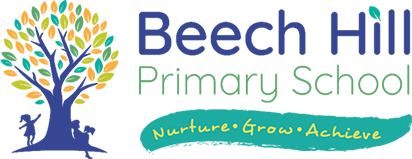Phonics
Whole School Approach to Teaching Reading
The English spelling code is one of the most complex in the world. It has evolved over hundreds of years and has had many different influences. As a result, words are made up of combinations of 44 different sounds but many of these sounds are spelt in different ways in different words. Furthermore, we only have 26 letters to write these sounds. This can lead to misconceptions for children, as letters combine together in different words to make different sounds. For example, the letter ‘a’ sometimes makes the sound /a/ (c-a-t), or, with other letters, the sound /ay/ (d-ay) or the sound ‘air’ (f-air). This can be overwhelming for early readers.
In order to help children conquer this complex code, we teach it systematically, using an evidenced based phonics scheme called Rocket Phonics. Rocket Phonics is a DfE-validated systematic synthetic phonics programme focusing on a whole class teaching approach, teaching children the relationship between sounds and letters to help them decode and spell words.
How will children be taught?
Children will be taught to identify, say and read all 44 sounds which Rocket Phonics have grouped into colour bands. The colour bands relate to the colour of the books that children will be able to read as they explore new letter sounds.
Children are taught one letter-sound over two days. The first day will focus on the skill of blending (for reading) and the second day will focus on the skill of segmenting (for writing). This two-day pattern will be repeated twice through the week, with the fifth day focusing on common exception words. We believe this provides children with a greater opportunity to learn, practice and apply the skills being taught before moving on.
Each session follows the same routine. This allows children to focus on the skill being taught and allows them to complete the task independently.
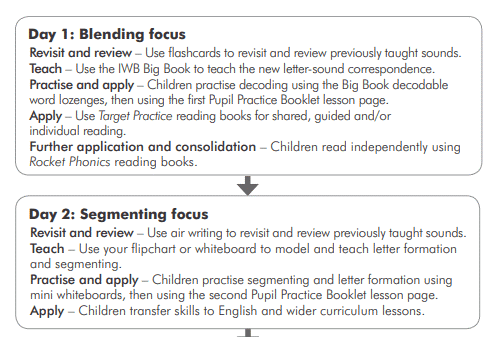
Comprehension
Being able to decode a text alone is not enough. Children need to make sense of what they are reading and need to be actively taught key comprehension skills. We do this through comprehension activities linked to the stories the children come to read within the Rocket Phonics scheme and also through a range of literacy activities based on core texts shared with the children.
We know that good readers question, check and engage with their own understanding; these are some of the skills we seek to develop in our pupils.
Rocket Phonics in practise – EYFS
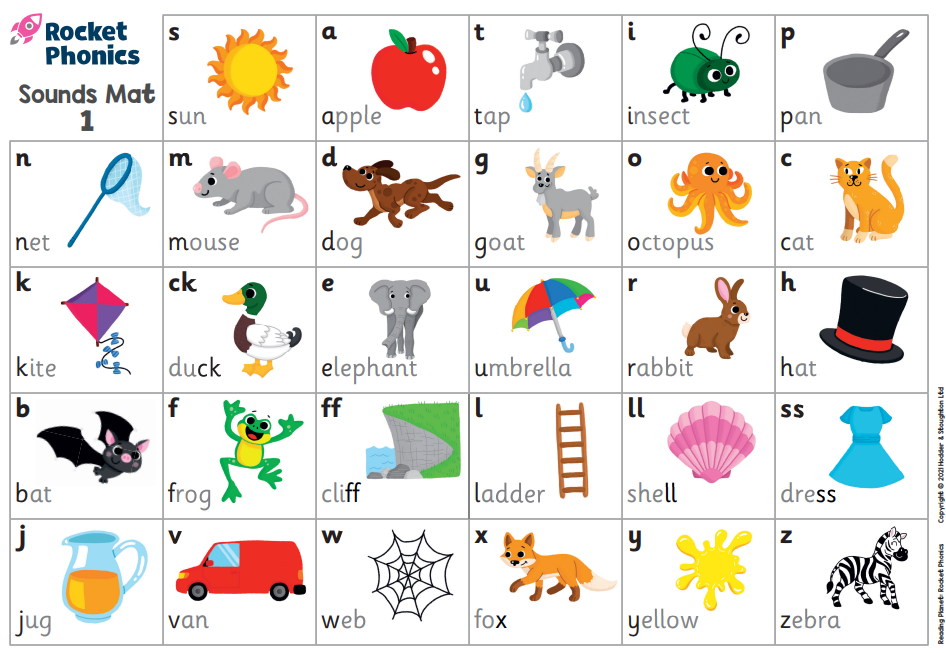
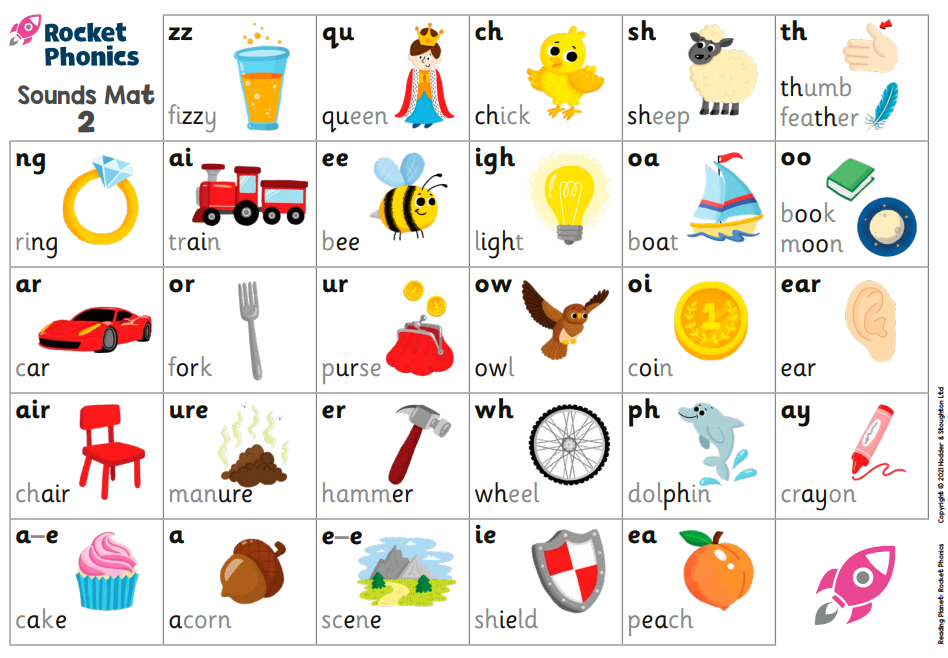 Children in EYFS will receive a daily phonics session. The sessions are taught using the Rocket Phonics resources, such as the big books, flashcards and pupil practice booklets. The sounds are taught in the order that they appear in the Rising Stars Rocket Phonics books. The chart above shows you the order that your child will be taught the sounds. Below are the Rocket Phonics videos to help with the pronunciations of the code that will be taught in EYFS. For parents of children in Year 1 this would also be useful revision!
Children in EYFS will receive a daily phonics session. The sessions are taught using the Rocket Phonics resources, such as the big books, flashcards and pupil practice booklets. The sounds are taught in the order that they appear in the Rising Stars Rocket Phonics books. The chart above shows you the order that your child will be taught the sounds. Below are the Rocket Phonics videos to help with the pronunciations of the code that will be taught in EYFS. For parents of children in Year 1 this would also be useful revision!
//www.youtube.com/embed/zX7dmuB4fNg#t=0.5
Autumn 1 - Pink A
//www.youtube.com/embed/X_HW2_Y5OEE#t=0.5
Autumn 2 - Pink B
//www.youtube.com/embed/5xIkatg0YIA#t=0.5
Spring 1 - Red
//www.youtube.com/embed/9ZrP6Z-Kahw#t=0.5
Spring 2 - Red B
//www.youtube.com/embed/Jf0pWl_Joj8#t=0.5
Summer 1 - Yellow
Rocket Phonics in practise – Year 1
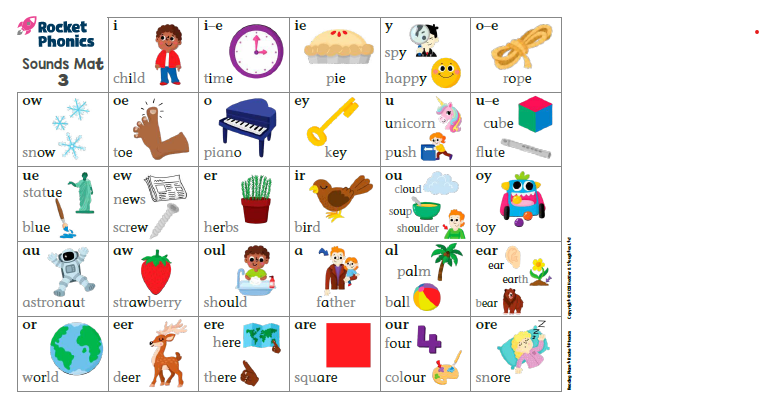
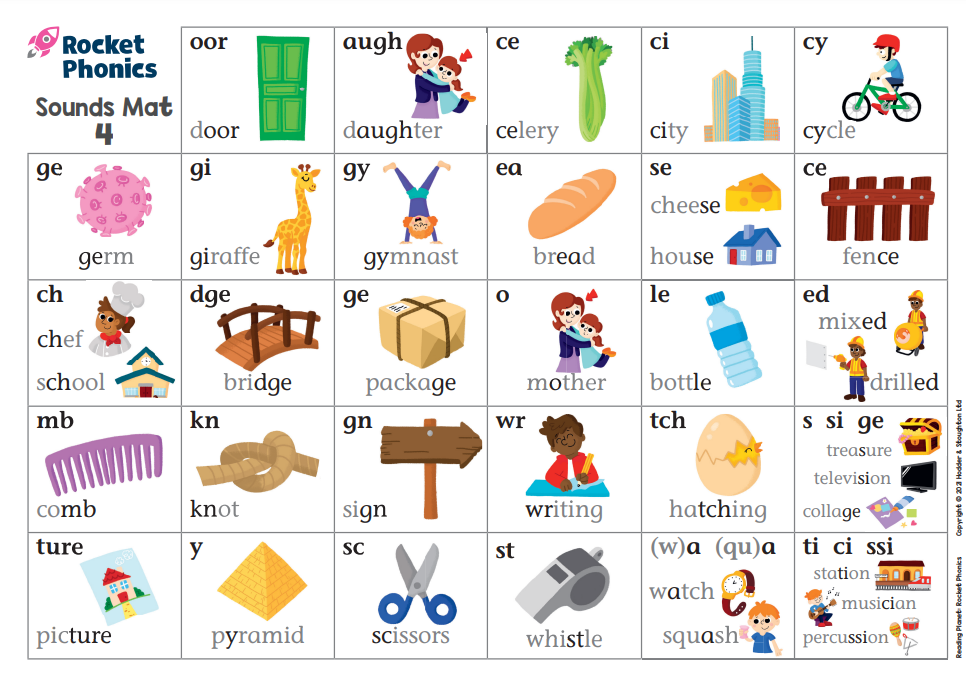
In Year 1 your child will continue to receive daily phonics lessons which will build upon the foundation established in EYFS. The below videos show the order in which your child will be taught these sounds and the term in which they will be taught.
//www.youtube.com/embed/vuPUrPNrhOg#t=0.5
Autumn 1
//www.youtube.com/embed/cJKxyNkr9MM#t=0.5
Autumn 2
//www.youtube.com/embed/6_wJDFFA3EM#t=0.5
Spring 1
//www.youtube.com/embed/WMIhIpx1vR8#t=0.5
Spring 2
//www.youtube.com/embed/-bL3C8EGuk0#t=0.5
Summer 1
//www.youtube.com/embed/VMLHXMc55HU#t=0.5
Summer 2
Phonics Screening test
In the Summer Term, children in Year 1 are required to take a statutory check to assess their understanding of phonics. Your child will be expected to read 40 simple words, which will be a mix of real words and nonsense words (there is an example of this on the right). If your child does not pass the test in Year 1 they will be given additional support in Year 2 and retake the assessment at the end of Year 2.
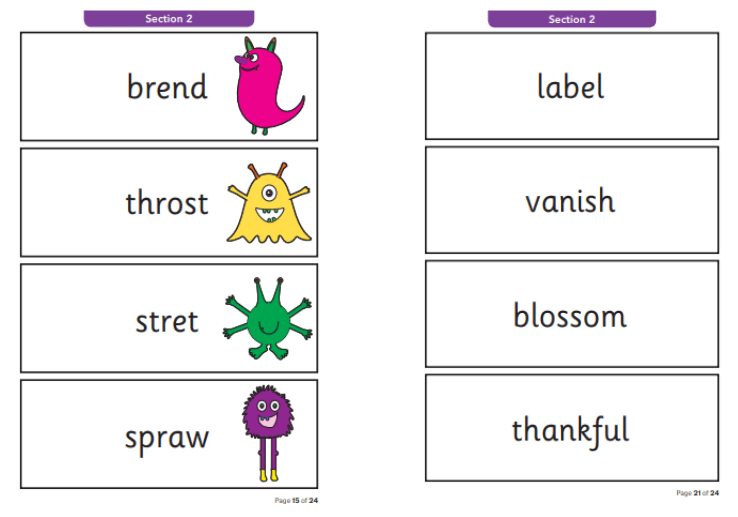
Supporting home reading
There is much you can do to support your child at home.
- Talk to them! The most important thing you can do is to talk to your child and listen to them when they are talking to you. Try to extend their vocabulary range and their skill at talking in increasingly more complex sentences. For example, try to teach them alternative words for ideas, or nouns they already know.
- We know as adults that you are very busy but we would encourage you to listen to your child to read to you on a daily basis, encouraging reading for pleasure.
- Read to your child daily and always discuss the story you are reading to try to build your child’s comprehension skills and understanding.
- Practise the sounds they know at home using the Rocket Phonic videos, which demonstrate every sound from band ‘Pink’ to band ‘Orange’.
- Attend in-school parent workshops on offer throughout the year.
Where to next?
Once children have learnt to read independently, they move onto our English curriculum. Lessons are focused around a series of carefully chosen, quality texts which act as the stimulus to teach higher level comprehension, continue to develop fluency and build children's knowledge of the world.
Please see the English subject page for further information about our English curriculum

